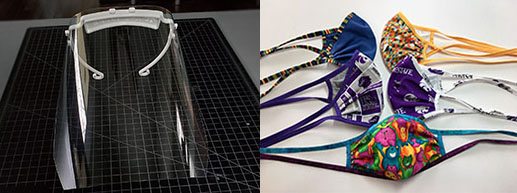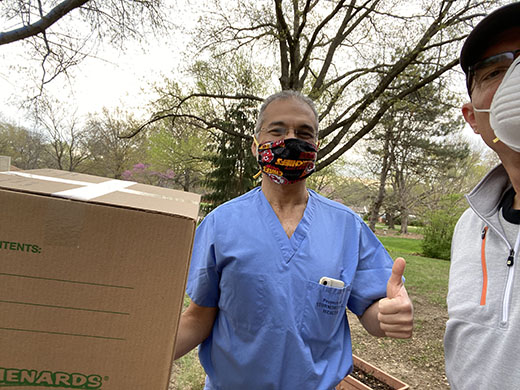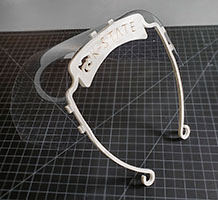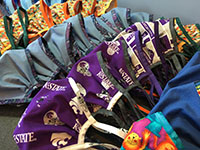Face time: K-State projects creating face shields, cloth masks
Friday, April 17, 2020

A 3D-printed face shield, left, made by student members of the Kansas State University Digital Fabrication Club, and face masks made by volunteers through a project led by K-State.
MANHATTAN — Area health care organizations are getting custom-made face shields and cloth face masks to help prevent the spread of COVID-19, courtesy of Kansas State University.
College of Architecture, Planning & Design students are 3D-printing face shields, while the Department of Interior Design and Fashion Studies in the College of Health and Human Sciences has teamed up with the K-State Office of Community Relations and Department of Environmental Health and Safety for a project to sew face masks.
The face shields are being made by students in the Digital Fabrication Club, or DigiFab Club. The students are under the direction of Jonathan Dessi-Olive, assistant professor of architecture. The shields feature the K-State Powercat and the word "K-State." Based on an open-source design plan, the shields are produced using the college's 3D-printing and laser-cutting resources.
"We have four printers up and running and are able to produce around 30 shields a day, barring any temporary printer breakdowns," said D.J. Plankinton, architecture student from Wamego and president of the DigiFab Club.
The frames of the shields are made out of PLA plastic and their front covers are made from sheets of clear acetate. The shields are disinfected after they are made, according to club member Matt Cox, architecture student from Southlake, Texas.
The club has made 175 face shields so far and demand for them is high.
"So far we have distributed 130 shields to local health care facilities from Junction City to Lawrence," said club member Aubry Sittner, architecture student from Tonganoxie. "We've even gotten requests from the hospital in Hoxie and as far away as Florida."
Grant Delka, interior architecture and industrial design student from Topeka, said the club is filling orders as quickly as it can, prioritizing requests from health care organizations.
Club members said they were inspired to get involved when they saw similar efforts from academia and professional practices in the architectural community.
Sherry Haar, professor of interior design and fashion studies, wanted to help the Riley County Health Department and Riley County EMS with their needs for fabric face masks.
"When worn correctly and washed after each use, a fabric mask can be an additional measure to the prevention practices of social distancing, hand washing and not touching your face," Haar said.
Working with Linda Cook, K-State chief of staff and director of community relations, and Christina Aguilera, director of K-State Environmental Health and Safety, Haar got university support to draft a team of volunteer sewers to make the masks.
"We have 31 volunteers in the fabric mask sewing network," Haar said. "The requirements include advanced sewing experience; access to cotton fabric, preferably from a personal stash; and a commitment to sewing 12 masks each week for three weeks."
Most of the volunteers are from the K-State family as well as local quilting guilds. The face mask pattern has been adapted with permission from Jessica Nandino's A.B. Mask — for a Nurse by a Nurse.
"I'm so impressed with our community," Haar said. "We had 25 volunteers within two days of sending a few emails. Several of the volunteers have already made hundreds of masks for other organizations, yet continue to offer their time, resources and skills."
The sewing network also has received donated materials from area fabric stores, including Linda Lee, a K-State interior design and fashion studies alumna and owner of The Sewing Workshop in Topeka, and Liv Olsen, owner of Fenceline Fabrics and The Thrifty Notion in Manhattan. Haar and her fellow interior design and fashion studies faculty members Marla Day and Kim Hiller and student Andrada Redmond, senior in apparel and textiles from Manhattan, used the donated fabric to make the initial batch of 80 masks. The initial masks include several from K-State-themed fabrics.
Once the masks are made, Aguilera made arrangements with Cintas, the uniform-maker and business cleaning company, to have the masks sanitized and then delivered to the Riley County Health Department and EMS.
Haar said she is committed to continue the project through the summer if needed.
"With the current volunteer sewing network, there will be around 1,200 masks donated by May 1," Haar said. "New volunteers will be added as current volunteers deplete their fabric stash and finish their commitment to the project."
Haar said volunteers are still needed and can contact her at haar@k-state.edu for more information.



